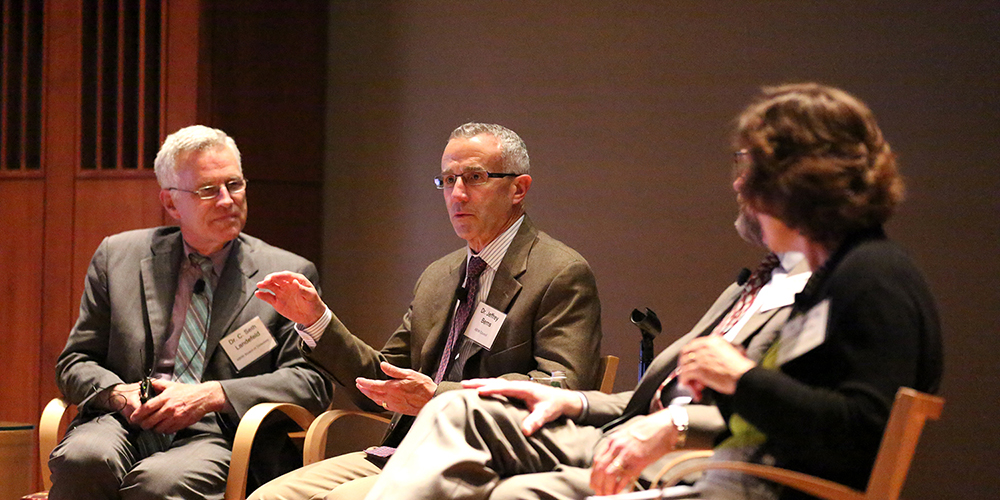Summary Report: Fall 2019 Nephrology Board Meeting
October 16, 2019 | Posted by ABIM | ABIM Governance, MOC, News
At our fall meeting, the Nephrology Board discussed the new longitudinal assessment pathway and how it would work for nephrologists. This major development shaped much of our time together as we discussed a number of important considerations for the nephrology community. The following is a report on the highlights of our meeting.
The Future of Assessment
Richard Baron, MD, ABIM President and CEO, welcomed the Nephrology Board and provided an update on the announcement of the longitudinal assessment pathway, and how it reflects ABIM’s core mission to create a meaningful credential and the need for summative standards. Dr. Baron also outlined ongoing planning activities related to development of this new pathway.
Following Dr. Baron’s update and presentations from other ABIM staff on the proposed longitudinal assessment option, the Nephrology Board shared their thoughts and reactions:
- The Board raised questions around how standards will be set for nephrologists.
- The Board expressed a desire to obtain more feedback from nephrologists on the proposed option and suggested booths at society conferences, webinars and town halls.
In addition to exploring ways to gain feedback from nephrologists suggested by the board, ABIM wants to hear from diplomates, nephrologists and society partners to help inform the direction of this assessment option. You can share your comments here.
Trends in Nephrology Certification
Procedural Competency in Nephrology Training
The Nephrology Board discussed its ongoing work with the American Society of Nephrology (ASN), including the letter sent to the Accreditation Council for Graduate Medical Education (ACGME) jointly by ASN and ABIM about deficits in procedural competency in nephrology training. One deficit discussed was that many programs lack the capacity to train fellows to competency on the performance of kidney biopsies, despite the fact that this skillset is a requirement for ABIM certification, and ACGME program accreditation. Historically there has been a lack of consensus within the program director community about whether performance of kidney biopsies should be taught in nephrology fellowship, though the ASN Council has maintained that they should remain in place. ABIM and ASN are awaiting the ACGME response before determining next steps.
Practice Pattern Survey
The Nephrology Board reviewed findings of a joint survey done by ABIM and ASN about practice patterns of ABIM-certified nephrologists, for the purpose of identifying whether customized assessments to subdomains of nephrology practice, i.e. “practice profiles” might be feasible. The survey identified a few common practice patterns that could be used to inform future exam blueprints.
Members encouraged staff to validate this self-report data against external practice information. However, the group tabled further discussion on “practice profiles” until input from transplant nephrologists could be obtained through collaboration with the American Society of Transplantation.
Fellowship Training
ASN released a call for letters of intent outlining innovative ideas related to nephrology fellowship training. ASN will review the proposals and connect sites with similar interests, and will facilitate applications to The ACGME Advancing Innovation in Residency Education (AIRE) program for approval as an official pilot training program. If also approved by ABIM, trainees graduating from these programs would then be Board eligible in nephrology and other ABIM disciplines by successfully completing the pilot programs.
Pre-Fellowship Procedures
The Nephrology Board held an in-depth discussion of procedural competencies internal medicine residents should demonstrate in order to transition successfully to a nephrology fellowship, i.e. pre- fellowship procedures. The concept of “pre-fellowship procedures” came out of the Internal Medicine Board’s decision that all residents must do some procedures, but not all residents must learn the same procedures and Program Directors must make opportunities available to become competent in practice- specific procedures needed for their next level of training.
Nephrology Board Chair Jeffrey S. Berns, MD, stated he will explore the opportunity to talk about pre- fellowship procedures with nephrology fellowship program directors at Kidney Week this fall.
Diplomate Professional Profiles
The Diplomate Professional Profile is currently being updated to include specialty-specific questions. Once finalized, diplomates will be asked to complete a periodic survey about the characteristics of their professional activity so that ABIM can assure relevancy of exam questions based on what physicians see in practice. Members gave feedback on the development of discipline-specific questions for the survey.
In Closing
The Nephrology Board welcomes feedback and commentary from diplomates, society partners and the greater medical community. We hope you find this report to be valuable and informative.
Do you have any questions? Are you interested in how to get involved?
If you have questions after reading this report, please connect with us through the following channels:
- Subscribe to blog.abim.org for regular updates
- Call:1-800-441-ABIM (2246)
- Email: request@abim.org
- Join our Governance to help guide our future direction
- Join our Community Insights Network to share your feedback.



